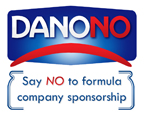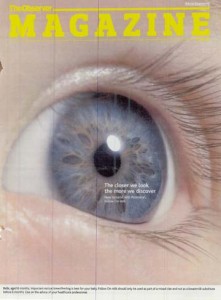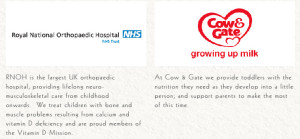Update 18 May 2015: Guardian Readers’ Editor says Danone-sponsored content “a mistake”
 The Guardian newspaper is planning to report in a future edition about improving the diet of pregnant women, infants and toddlers and policy in these areas. This is something Baby Milk Action would normally welcome and we would expect a strong line to be taken on baby food companies contributing to unnecessary death and suffering by undermining breastfeeding and misleading parents who use formula.
The Guardian newspaper is planning to report in a future edition about improving the diet of pregnant women, infants and toddlers and policy in these areas. This is something Baby Milk Action would normally welcome and we would expect a strong line to be taken on baby food companies contributing to unnecessary death and suffering by undermining breastfeeding and misleading parents who use formula.
However, we have been contacted by some of those invited to a roundtable discussion to prepare the report who have been shocked to find that Danone, a corporation notorious for violating baby food marketing rules, is behind the initiative.
One commented, ‘Quite surprised at The Guardian but then I guess they get a large fee for it.’
[Update: The article appeared on 22 April 2015 and does not include any information critical of Danone, although Baby Milk Action provided this to the organisers – see: Media studies: Danone-sponsored content in The Guardian.]
If you think The Guardian should introduce an ethical policy for sponsors and partners for its roundtable discussions and reports, then email: rsvp.roundtables@theguardian.com
Click here to download the leaked invitation. The Guardian is organising the event in association with Danone under its ‘Public Leaders‘ initiative, which aims to ‘tackle the most important issues facing all managers of public services.’ It will publish articles on 22 April to promote Danone’s agenda. Danone has hijacked the First 1000 Days health message for its own purposes. It is also actively targeting public services, including offering nurseries cash to display posters and vouchers for its unnecessary growing-up milks and offering training to staff and service users. Such activities violate World Health Assembly policies on conflicts of interest.
Baby Milk Action contacted The Guardian last week for a response to the concerns, but has still not received a reply.
The event planned for 8 April follows a similar Guardian event in 2014 that formed part of Danone’s agenda for promoting its growing-up milks – products that the Department of Health and World Health Organisation say are unnecessary.
There is a self-evident conflict of interest in running such events and reports in association with Danone:
- Danone systematically violates baby food marketing standards adopted by the World Health Assembly, undermining breastfeeding and misleading parents who use formula. The Guardian has a long history of exposing such malpractice – no doubt, part of the reason is it being courted by Danone. For example, Zoe Williams wrote on Danone’s activities in Indonesia in 2013. Such violations constitute abuses of the Convention on the Rights of the Child.
- Danone is now the world’s second largest baby food company after a series of acquisitions, including Nutricia, Cow & Gate and Aptamil in 2007. It now rivals Nestlé, the market leader, as a source of global violations (See IBFAN’s Breaking the Rules reports).
- A DanoNO campaign encouraging people to avoid Danone sponsorship was launched by IBFAN in 2014 alongside the Nestlé boycott as Danone has rejected calls by IBFAN to bring policies and practices into line with minimum marketing standards.
- Nestlé entered the UK market in 2012 with the takeover of the SMA brand, and its marketing war with Danone has erupted here. Both companies are attempting to bypass the restrictions many health facilities have on marketing staff contacting health workers by organising their own events.
- Both Danone and Nestlé are trying to be seen as partners in health programmes. They have both hijacked the First 1000 Days health message (Nestlé, at least, has said openly to its investors that this is to promote its ‘product solutions’). The World Health Assembly (made up of the world’s health ministries) has specifically said that conflicts of interest should be avoided in sponsorship of health programmes.
The Guardian has given good coverage to the baby milk issue over the years (we helped journalists investigating Nestlé in Bangladesh). More recently, however, it has been looking at innovative ways to fund its operations as print sales fall. On the one hand, it has invited readers to become partners or patrons. On the other, it offers corporations the chance to sponsor events and even sections of the newspaper, which has thrown up links with corporations such as Danone and organisations pushing a corporate agenda into health policy, such as GAIN and the Gates Foundation.
Disclosure: As a daily reader of The Guardian online, I recently responded to a message from George Monbiot to become a member, paying £135/year (George has written in The Guardian on the baby milk issue in both the United Kingdom and internationally). ‘If you believe in Guardian journalism, become a Guardian Member’, was the message. If we want independent journalism then we have to pay for it. So I feel doubly let down that The Guardian has sold out to Danone. Now it falls to organisations such as Baby Milk Action to speak truth to power – and that responsibility includes voicing our disappointment in The Guardian.
In recruiting The Guardian to invite leading authorities to its event, Danone is attempting to break through conflict of interest safeguards and improve its reputation. Danone – like Nestlé – tries to persuade critics to meet with it, or join ‘stakeholder forums’. Health advocates have rejected these moves, pointing out that companies can have far more impact by changing their own activities if they really care about infant health.
While many people contacted by The Guardian on Danone’s behalf will immediately discard the invitation (or contact us), any who do attend will be drawn into defending Danone as a sponsor. They may also, wittingly or not, become part of Danone’s marketing strategy.
The Guardian, has already promoted Danone formula in its publications of course. It notoriously ran misleading advertising in its Observer Magazine 6 months after Zoe Williams exposé of Danone in Indonesia. Four pages of advertisements appeared in the magazine on 27 October 2013, including the front cover. These violate both the international marketing standards and the Infant Formula and Follow-on Formula Regulations (2007) as we set out on the Baby Feeding Law Group website.
This financial link seems to have heralded a new relationship between the paper and company. The Guardian ran an event some months later that helped promote Danone’s marketing agenda with a report published on 2 April 2014: Action needed on the ‘sunshine’ vitamin.
The article refers to Vitamin D mission, a Danone initiative used explicitly to promote its Cow & Gate growing-up milks, which are unnecessary products, according to the Department of Health and World Health Organisation. A ruling by the Advertising Standards Authority in June 2014 (A13-238372) upheld complaints about misleading claims Danone Nutricia makes for growing up milks:
‘We told Nutricia that their future advertising must not imply or state that a young child’s intake of vitamin D, and as a result their health, could be affected if they did not consume Growing Up Milk.’
That Guardian article declares: ‘Seminar report commissioned and controlled by the Guardian. Discussion hosted to a brief agreed with Danone. Funded by Danone.’
But that declaration was lost in other reporting, such as on the Royal College of Paediatric and Child Health website, which gives the outcome of the discussion, without mentioning it was to Danone’s brief and funded by the company.
This is something that Judith Richter has described as ‘two-step communication’: a corporation puts its message into a news source or other forum, which are then reported as if unconnected to the company.
We have already raised our concerns with The Guardian and RCPCH about the past event. We also wrote to the Royal National Orthopaedic Hospital (RNOH), which appears on the Vitamin D Mission website alongside promotion for Danone’s Cow & Gate growing up milk:
RNOH Chief Executive, Rob Hurd, responded to us on 2 March 2015, and promised to review the RNOH association with Vitamin D Mission, as it did not intend to promote its products. But checking the site today, over a month later, the growing-up milk promotion continues. There is need to raise awareness of the risks of Vitamin D deficiency and the need for supplementation of under-5 children where there is a lack of sunlight (as recommended in the UK), but this message has been perverted by Danone to boost sales of its fortified milks.
Independent assessment of such milk by First Steps Nutrition Trust states:
Fortified milks are frequently high in sugar and are likely to contribute to higher energy intakes, which may contribute to chronic disease, and the voluntary fortification of foods and drinks needs to be questioned as there is increasing evidence that giving additional nutrients to those who do not need them may have adverse consequences.
Parents have a right to accurate information on infant nutrition under Article 24 of the Convention on the Rights of the Child. This is why it is important for health workers and others to respect World Health Assembly Resolution 58.32, which states:
‘ensure that financial support and other incentives for programmes and health professionals working in infant and young-child health do not create conflicts of interest.’
Formula is a legitimate product – and we campaign to improve quality and end predatory pricing. But make no mistake, companies that market breastmilk substitutes in violation of marketing standards and so undermine breastfeeding contribute to the unnecessary death and suffering of children around the world. Breastfeeding saves lives – and could save more. Estimates in 2013 suggest 11.6% of under-5 deaths could be prevented by breastfeeding. The World Health Organisation (WHO) says: ‘Globally, breastfeeding has the potential to prevent about 800,000 under-five deaths per year if all children 0–23 months were optimally breastfed.’
We call on The Guardian to stop working in league with Danone and to cancel this event. We ask those invited to consider the conflicts of interest involved in attending.
If you think The Guardian should introduce an ethical policy for sponsors and partners for its roundtable discussions, then email: rsvp.roundtables@theguardian.com
If The Guardian invited you to attend, please let us know, or post your comments below.




We are breeding a race of sub-humans by not allowing babies to breastfeed. DHAs health claims are damaging the future of children who would otherwise grow up strong and true. Saying that forumula is a healthy strart is false advertising and measures should be taken to stop the exploitation of vulnerable people. I read in a breastfeeding book once that comparing formula to breast milk was like comparing dirty dish water to the best champagne. Let them drink champagne.